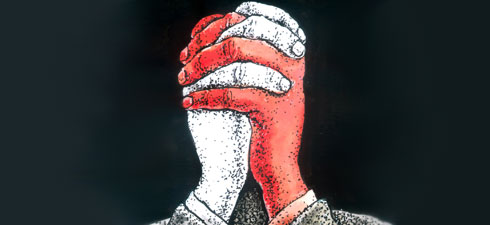Going into debt today means a poorer tomorrow. That’s why austerity is the alpha and omega of a policy that is meant to ensure the continued survival of that half-freewheeling, half-iron-clad grouping of states that we have somewhat hastily called the European Union. This priority is perceived in some states of the EU as a diktat from Germany. That’s not fair.
And yet, if we’re to tell the whole truth, we have to admit that the new European austerity policy is also doing some damage. As nice as the talk about federal Europe (including its supposedly subnational structure) sounds, the reality is that it’s not just the financial crisis but the overall interests of the Union that can have a serious impact on sovereignty.
Neither Italy nor Greece’s new government would have come into office without pressure from the EU. As long, however, as the individual countries of Europe do not really conceive of the EU as a community, such steps are rightly grasped by the citizens as disenfranchisement and expropriation. To some that may even be welcome.
A recent example of this is an EU member state that was allowed to join the club too early and in too unsettled a state: Romania. There a violent battle is presently raging between cliques from the former socialist era, embodied by Prime Minister Victor Ponta, and the not exactly unblemished Conservatives, over President Traian Basescu, who has been cashiered by Parliament.
In Romania, rotten with corruption, the various political forces view the state as their looting ground. And those who want to put an end to this state of affairs, like the courageous former Justice Minister Monica Macovei, lack the tools to tackle it effectively.
Austerity fiat
They place their hopes on Romania’s becoming enmeshed in the EU – that is, that the EU will not accept the practice of perverting justice. For those who want a democratic Romania, this is a plus, because without the EU’s contractually stipulated power to intervene they would be even more isolated than they already are.
That’s the good part of being bound to the EU. The bad part is that the power to enforce the rule of law does not come from within a country – and in a way, it does not even need to. The safety net that comes from being within the EU can indeed enforce certain standards, but it does not necessarily bolster the democratic forces in such states.
Hungary furnishes an example of this paradoxical effect. The national conservative government under Viktor Orbán, in seeking to place the power of the ruling party Fidesz above state institutions, is very consciously obstructing the counterbalancing force of those institutions. This the EU cannot allow.
Again and again they force major or minor retreats on Orbán, on media policy or on the status of the central bank. When the EU puts its foot down, Orbán gives way with operetta-like gestures: he obliges – and with an ironic twinkle in his eye signals at the same time that he is doing so only under compulsion and that he will always find ways of properly watering down the Brussels “dictate”. In this game of ping-pong between Orbán and the EU, Hungary’s domestic opposition plays no decisive role.
To put it bluntly, having the moral police of democracy sited in Brussels is sapping the Hungarian opposition of its meaning. In any case, the game between Brussels and Budapest is not necessarily appropriate for promoting in Hungary what must never be left out of almost any EU communiqué: the self-confidence of civil society – and its capability to intervene.
The austerity fiat of the EU, however, can also impact the inner social clockwork of individual countries pieced together over many centuries. This is happening right now in Italy. Since Italian unification came so late in European history, Italy is a difficult and shaky nation-state. More than almost any other country in Europe, it thrives on the diversity of its regional and especially local identities.
Little homelands
That is what the Italians prize (as we do) about their country: a diversity that is as stamped by the landscape as it is by the architectural traditions, and not least by the varying cuisines.
Now the country must tighten its belt, and the resolute Mr. Monti, who now has the rating agencies and Signor Berlusconi breathing down his neck, must downsize wherever he can: in the public administration, health care, welfare, etc. A natural consequence of this is to cut back too on the uncontrolled flourishing (a cultural habit) of regional and local administrations.
The government wants to significantly reduce the number of provinces, regions and municipalities. The voice of reason says it must be done; but emotions and history are not so sure. What most embitters many Italians is that this deconstruction is not to be carried through out of any domestic Italian logic, or domestic Italian considerations, but is being imposed, they feel, from Brussels.
As the journalist Francesco Merlo wrote, Italy’s “little homelands” are under threat. These little homelands may be dysfunctional in Brussels’s view, but they are also safe. It’s just that in Brussels they forget one thing: the real lives of real people is not an issue of ‘functionality’.
Worries like those about the little homelands, unfortunately, steal up on our EU politicians only when they privately surrender to the pleasures that a Franconian inn, a Breton restaurant or a trattoria in Piedmont can so richly give.
Was this article useful? If so we are delighted!
It is freely available because we believe that the right to free and independent information is essential for democracy. But this right is not guaranteed forever, and independence comes at a cost. We need your support in order to continue publishing independent, multilingual news for all Europeans.
Discover our subscription offers and their exclusive benefits and become a member of our community now!












